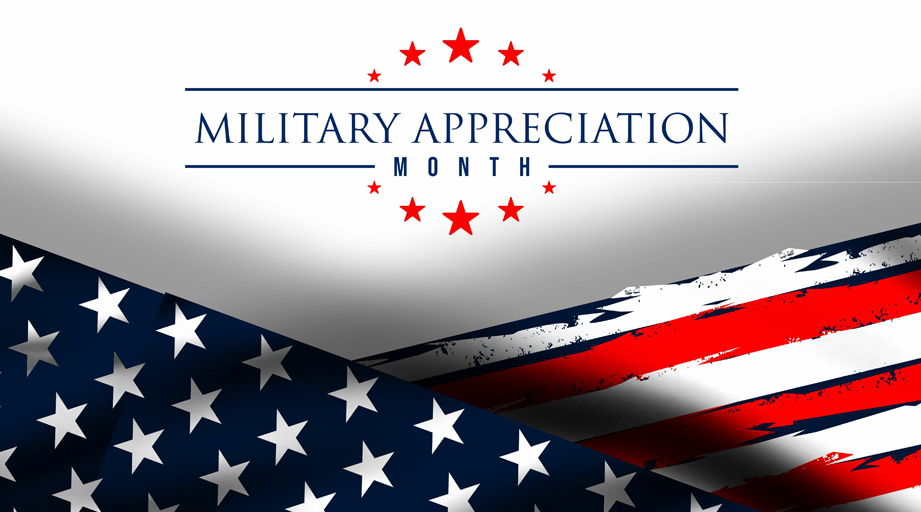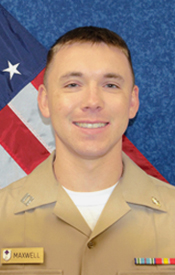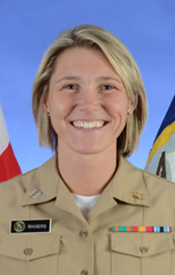
When Lt. Hunnter Maxwell joined the Navy right out of pharmacy school, he got an unusual opportunity to enroll in a new training program that teaches inpatient pharmacy skills necessary for deployment.
Maxwell, who until then had worked only in retail settings, jumped at the chance.

“It’s like a mini residency that helps us forward deploy pharmacists,” explained Maxwell, based at A.T. Augusta Military Medical Center in Ft. Belvoir, Virginia.
Now nearly two years old, the Navy began the Pharmacy Officer Readiness Training (PORT) program after several leaders identified skill gaps among stationed and deployed pharmacist officers. One of those leaders was ASHP member Lt. Commander Chirag H. Patel, who had been stationed in at a Naval hospital in Guam.
Patel, who is now based at A.T. Augusta, said deployed pharmacists must be comfortable doing everything from managing drug shortages to making IVs.
“A lot of our pharmacy officers are great at outpatient pharmacy,” said Patel, “but inpatient pharmacy is a skill not everybody has.”
Once he returned from Guam, he talked with a colleague, Lt. Commander James Spence, about finding a way to ensure pharmacy officers were prepared for missions. A survey of Navy pharmacists also indicated a need for a training program.
Residency programs are essential for performing many patient care services and required for positions within specialties. But for new officers joining the Navy fresh out of pharmacy school, said Patel, residencies aren’t necessarily realistic.
“These are like wartime skills,” he said. “Wouldn’t it be wonderful if the pharmacists could do a residency? That’s like the panacea, right? But not everybody can do that, the workforce can’t do that, and we need people here to get the job done, get the mission done and be ready to be deployed.
“It was like how do we bring this program to reality while still working in the spaces we’re in?”
Experts in the Navy developed a hands-on training program, including clinical exposure, at five sites. All new pharmacy officers are eligible to participate.
One of the earliest participants was Lt. Meagan B. Rawers, now a satellite division officer at the Naval Hospital in Jacksonville, Florida.

Rawers did have some inpatient experience. She joined the Navy after practicing for two years at the University of Cincinnati Medical Center following graduation from pharmacy school. But the PORT program helped her develop new skills.
“One of the biggest things was supply chain,” she said. “The pharmacists here are constantly placing medication orders, looking at shortages, and as a civilian pharmacist, that always felt more on the administrative side for me. In Navy pharmacy, it’s us doing all of that, so we have to know how the supply chain works. Part of the PORT program walks you through how to make therapeutic interchanges and how to do the ordering and the budgeting.”
The Navy employs pharmacists in more than 250 facilities in the U.S. and overseas. As part of the Naval Medical Service Corps, pharmacists also lead personnel at national medical centers in Bethesda, Maryland; Portsmouth, Virginia; and San Diego, California. They have also been called on to provide support aboard aircraft carriers or one of two dedicated hospital ships, the USNS Comfort and USNS Mercy.
Rawers noted that historically, pharmacists haven’t served on medical ships for long periods of time. However, the Navy’s not-yet-launched medical expeditionary unit ships will include pharmacists on the healthcare teams. She has already toured one as part of a team making recommendations, including helping create a medication allowance list.
“When I first joined the Navy, I thought, well, pharmacists don’t really deploy, but this will be really good experience to serve other people who serve our country and use my specialty in a support role,” she said. “But now I’m like well, I’m going to be the person deployed. It’s eye opening but exciting.”
Maxwell said his eight months in the PORT program included doing bedside tasks, working with nurses, and talking to clinical pharmacists and physicians on their rounds. He also helped prepare presentations, including one on traumatic brain injuries.
Now the officer in charge of inpatient pharmacy at A.T. Augusta, Maxwell said he feels better prepared for future missions. “If our name gets called, we can go out and have the capabilities to run an inpatient setting,” he said.







